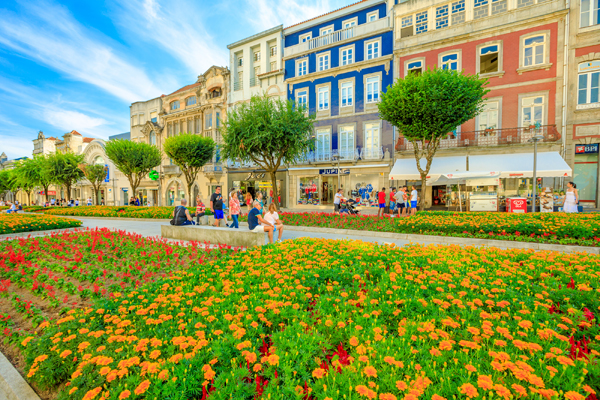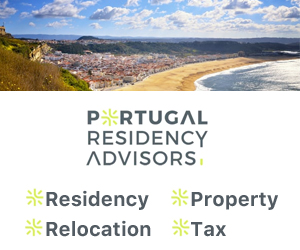Cost of Living in Braga
Summary: If you're moving to Braga, understanding the the cost of living in Braga helps you know what to expect when it comes to apartment or house hunting, grocery shopping, transportation, dining out, utilities and more.

| Category | Cost |
|---|---|
| Apartment Rental (1 bedroom in City Centre) | €500 - €700 per month |
| Apartment Rental (1 bedroom Outside of Centre) | €350 - €500 per month |
| Apartment Purchase (Price per Square Meter in City Centre) | €2,000 - €2,500 |
| Apartment Purchase (Price per Square Meter Outside of Centre) | €1,200 - €1,700 |
| Public Transportation (Monthly Pass) | €30 - €40 |
| Gasoline (1 liter) | €1.50 - €1.70 |
| Basic Utilities (Electricity, Heating, Cooling, Water, Garbage for 85m2 Apartment) | €100 - €150 per month |
| Internet (60 Mbps or More, Unlimited Data, Cable/ADSL) | €30 - €40 per month |
| Groceries (Milk, Bread, Eggs, Fruits, Chicken, Beef, etc. for a family of four) | €200 - €300 per month |
| Meal at an Inexpensive Restaurant | €7 - €10 |
| Meal for 2 People, Mid-range Restaurant, Three-course | €30 - €50 |
| Private Preschool Tuition (per month) | €250 - €400 |
| Private Elementary School Tuition (per year) | €3,000 - €5,000 |
| Private Middle School Tuition (per year) | €4,000 - €6,000 |
| Private High School Tuition (per year) | €5,000 - €7,000 |
Monthly Budget for Retirees in Braga
"The cost of living in Braga is considered to be relatively affordable compared to other European cities. Rent for a one-bedroom apartment in the city center is quite reasonable, while outside the city center, it is even cheaper. The cost of utilities such as electricity, heating, cooling, and water is also quite low. Groceries in Braga are also affordable, with local markets offering fresh produce at reasonable prices. Eating out at restaurants is also not very expensive, with a meal at an inexpensive restaurant being quite affordable. Public transportation in Braga is also reasonably priced, with monthly passes available for regular commuters. However, owning and maintaining a car can be more expensive due to the cost of gasoline and parking. Healthcare in Braga is also affordable, especially if you are covered by the national health service. However, private healthcare can be more expensive. Overall, the cost of living in Braga is quite low, making it an attractive place for expats and retirees," said one expat living in Braga.
Can I live in Braga on $1,500 a month?
"I've been living in Braga for a few years now and I can tell you that it's definitely possible to live comfortably on $1,500 a month, but it does require some careful budgeting and lifestyle adjustments. For instance, you might have to give up eating out at high-end restaurants frequently or limit your shopping sprees. But don't worry, the local cuisine is fantastic and there are plenty of affordable places to eat. In terms of housing, the cost can vary greatly depending on the neighborhood. The city center, for example, is quite expensive. A one-bedroom apartment there can cost you around $800 to $1,000 a month. However, if you move a bit further out to neighborhoods like Ferreiros or Nogueira, you can find a nice place for around $500 to $600. These areas are still very accessible and have all the necessary amenities like supermarkets, pharmacies, and public transportation. Utilities are another thing to consider. On average, you can expect to pay around $100 to $150 a month for electricity, water, and gas. Internet and mobile plans are quite affordable, usually around $30 to $40 a month. Groceries can be quite cheap if you shop at local markets and buy seasonal produce. I usually spend around $200 to $300 a month on groceries. Eating out is also quite affordable. A meal at a decent restaurant will cost you around $10 to $15. Transportation is another area where you can save. Public transportation is quite efficient and affordable. A monthly pass costs around $40. If you prefer to drive, petrol costs around $1.50 per liter. Healthcare is another important factor. Portugal has a good public healthcare system, but as an expat, you might want to consider getting private health insurance. This can cost you around $50 to $100 a month, depending on the coverage. So, if you add it all up, living in Braga on $1,500 a month is doable, but it doesn't leave much room for extras like travel, entertainment, or savings. However, if you're willing to live a bit more modestly, it's a great place to live with a rich culture, beautiful scenery, and friendly people," commented an expat living in Braga.
Can I live in Braga on $3,500 a month?
"I've been living in Braga for a few years now and I can tell you that it's definitely possible to live comfortably on $3,000 a month, even if you're used to modern amenities. The cost of living here is quite reasonable compared to many other European cities. For instance, you can rent a nice one-bedroom apartment in the city center for around $600-$700 a month. If you're willing to live a bit further out, in neighborhoods like Ferreiros or Gualtar, you can find even cheaper options. Utilities, including electricity, heating, cooling, water, and garbage, will likely cost you around $100-$150 a month. Internet and mobile phone services are also quite affordable, usually around $30-$50 a month. Groceries are another area where you can save a lot. Local markets offer fresh produce, meat, and fish at very reasonable prices. You can expect to spend around $200-$300 a month on groceries if you cook at home most of the time. Eating out is also not too expensive. A meal at an inexpensive restaurant will cost you around $10, while a three-course meal for two at a mid-range restaurant will be around $35. Public transportation is quite efficient and affordable in Braga. A monthly pass costs around $40. However, if you prefer to drive, keep in mind that gasoline prices are higher than in the U.S., around $6 per gallon. Healthcare is another important factor to consider. Portugal has a good healthcare system and the cost is much lower than in the U.S. A visit to a general practitioner will cost you around $35, while a visit to a specialist will be around $50. As for the sacrifices, you might find that some goods, especially imported ones, are more expensive than back home. Also, if you're used to a fast-paced lifestyle, you might need to adjust to the more relaxed pace of life in Braga. In terms of neighborhoods, São Vicente and São Vítor are quite popular and centrally located, but they can be a bit more expensive. If you're looking for more affordable options, consider neighborhoods like Ferreiros, Gualtar, or Nogueiró. On the other hand, neighborhoods like Tenões or Lamaçães are quite upscale and might be out of your budget. But overall, I think you'll find that Braga offers a good quality of life for a reasonable cost," said one expat living in Braga.
Can I live in Braga on $5,000 a month?
"I've been living in Braga for a few years now and I can tell you that living on $5,000 a month is not only possible, but you can live quite comfortably. The cost of living here is significantly lower than in many other European cities. For instance, you can rent a nice apartment in the city center for around $800 to $1,000 a month. If you prefer to live in a more upscale neighborhood, like São Vítor or Lamaçães, you might have to pay a bit more, maybe around $1,200 to $1,500 a month. But there are also more affordable neighborhoods like Ferreiros or Santa Tecla where you can find cheaper rents, around $600 to $800 a month. Groceries are also quite affordable. I spend around $300 a month on groceries, but I like to cook at home a lot. If you prefer to eat out, a meal at a mid-range restaurant will cost you around $15 to $20. Utilities, including electricity, heating, cooling, water, and garbage, will cost you around $100 to $150 a month. Internet and mobile phone services are also quite affordable, around $50 a month. Transportation costs are also quite low. A monthly pass for public transportation costs around $40. If you prefer to drive, gasoline costs around $1.50 per liter. Healthcare is also quite affordable. The public healthcare system is good, but if you prefer private healthcare, a health insurance plan will cost you around $50 to $100 a month. As for entertainment, there are plenty of affordable options. A movie ticket costs around $7, a theater ticket around $20, and a gym membership around $30 a month. So, if you add up all these costs, you'll see that you can live quite comfortably on $5,000 a month. Of course, you'll have to adjust your lifestyle a bit. You might not be able to dine at high-end restaurants every night or live in the most upscale neighborhood, but you'll still be able to enjoy a good quality of life. And the best part is that you'll be living in a beautiful city with a rich history and culture, great weather, and friendly people," commented an expat living in Braga.
About the Author
 Betsy Burlingame is the Founder and President of Expat Exchange and is one of the Founders of Digital Nomad Exchange. She launched Expat Exchange in 1997 as her Master's thesis project at NYU. Prior to Expat Exchange, Betsy worked at AT&T in International
and Mass Market Marketing. She graduated from Ohio Wesleyan University
with a BA in International Business and German.
Betsy Burlingame is the Founder and President of Expat Exchange and is one of the Founders of Digital Nomad Exchange. She launched Expat Exchange in 1997 as her Master's thesis project at NYU. Prior to Expat Exchange, Betsy worked at AT&T in International
and Mass Market Marketing. She graduated from Ohio Wesleyan University
with a BA in International Business and German.
Some of Betsy's articles include 12 Best Places to Live in Portugal, 7 Best Places to Live in Panama and 12 Things to Know Before Moving to the Dominican Republic. Betsy loves to travel and spend time with her family. Connect with Betsy on LinkedIn.
Additional Information:
- Public Transportation in Braga
- Pros & Cons of Living in Braga
- Best International Schools and Bilingual Schools in Braga
- 7 Weekend Getaways for Digital Nomads Living in Braga
- Public Transportation in Braga
- Best Markets in Braga
- Retire in Braga Guide
- 7 Tips for Living in Braga
- Pros & Cons of Living in Braga
- Driving in Braga
- Health Care in Braga
- The Essential Guide to Braga
- Cost of Living in Braga
- Healthcare & Health Insurance in Portugal
- Best Places to Live in Portugal
- Real Estate in Portugal
- Mental Health Care in Portugal
- Pros and Cons of Living in Portugal 2025
- 2025 Guide to Moving to Portugal
- More Advice about Retiring in Portugal




